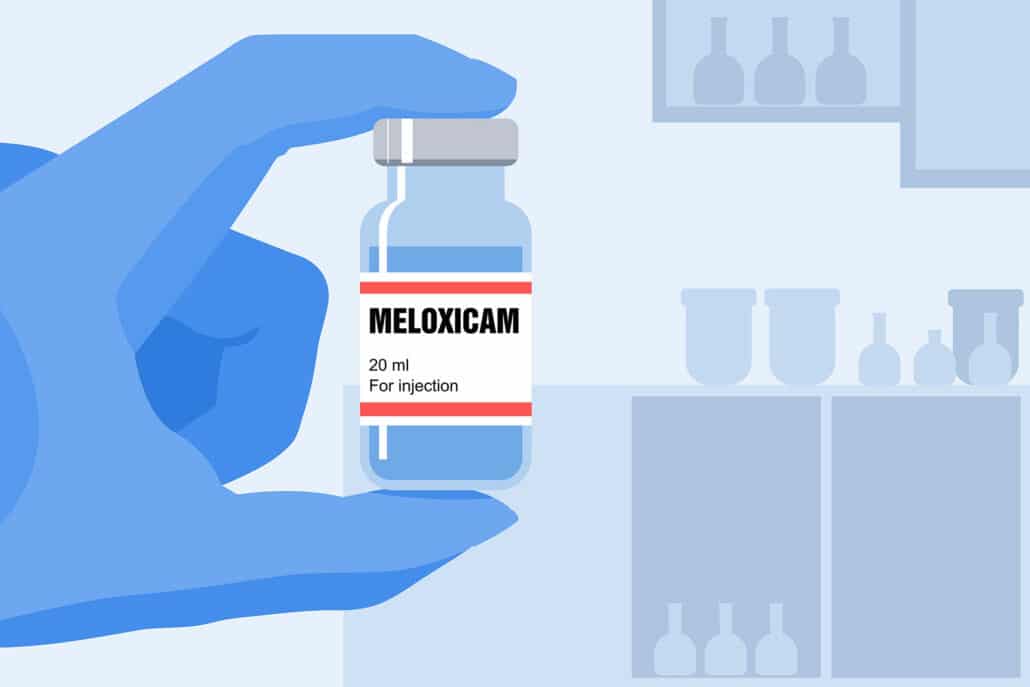Hope for a drug that relieves your pain can vanish when it does not do what you wish. Even more disappointing, it may cause addiction. Meloxicam fits in a category of drugs that treats the discomfort of arthritis in its various forms. Nonsteroidal anti-inflammatory drugs (NSAIDs) include some of the most often recommended treatments for pain and inflammation. While the availability of Advil, Motrin, Ibuprofen, Aleve, and many others may make them seem harmless, they can do more harm than you may imagine. Meloxicam goes by several names, including Vivlodex, Qrniiz, or the generic Mobic.

Table of Contents
- 1 What is Meloxicam?
- 2 Experiencing Meloxicam Side Effects
- 3 Seeing the Connection between Meloxicam and Heart Disease
- 4 Wondering if Meloxicam Offers More Safety than Opioids
- 5 Considering the Addictive Potential of Meloxicam
- 6 Understanding Meloxicam as Not Addictive but Dangerous to Misuse
- 7 Relying on Safety Reminders
- 8 Following Advice by the U.S. Food and Drug Administration
- 9 Getting the Help You Need
What is Meloxicam?
The symptoms of pain and inflammation that come with arthritis receive treatment with meloxicam or Mobic because of its effectiveness as an alternative to opioid painkillers. NSAIDs such as meloxicam can block enzymes that cause those conditions to occur. As a prescription drug, it can offer more relief than over-the-counter medications. As a result of its greater effectiveness, smaller doses can help relieve the inflammation and pain in the body that cause extreme discomfort. Relief from swelling and tenderness that can result from arthritis and other conditions makes meloxicam an alternative for managing pain.
Experiencing Meloxicam Side Effects
An upset stomach ranks as the side effect people mention most often. A recommendation to take it with food may accompany a prescription to use it. However, many other side effects can occur while taking the drug, including these:
- constipation
- diarrhea
- dizziness
- flu-like symptoms
- gas
- heartburn
- nausea
- stomach pain
- vomiting
The most frequent complaints of side effects include abdominal pain. In addition, other consequences include these:
- rashes
- hives
- fever
- itching
- shortness of breath
- blurred vision
- drowsiness
- fluid retention
- headache
- increased blood pressure
Any conditions that concern you may require medical attention to prevent significant health issues from occurring sooner or later. Some long-term effects may include ulcers that may bleed and become fatal if untreated. Hypertension may result from use as well, requiring regular monitoring of blood pressure.
Understanding the Relationship between Meloxicam and Kidney Function
A significant danger exists to the health of your kidneys when you take Meloxicam. The drug may lessen their ability to function. Therefore, anyone who has kidney problems, including the possibility of kidney failure, needs to proceed carefully when considering using the drug. The concerns about its effect on the internal organs extend to elderly patients and anyone who has a heart condition. In addition, patients who use diuretics or ACE inhibitors need to avoid using them. Further, some severe toxic skin conditions may occur.

Seeing the Connection between Meloxicam and Heart Disease
Most NSAIDs, including meloxicam, can increase the risk of heart attack or stroke in anyone who has the risk for heart disease. The level of risk increases for anyone who has a diagnosis of heart disease. The threat may occur early in the use of the drug, even as soon as the first week. The seriousness of the potential outcome of taking the drug may require careful examination of the risks involved. Unfortunately, even someone who has no history of heart issues can have a stroke while taking the medication. Any use of the drug by anyone at risk for heart failure requires the approval and supervision of a doctor.
Wondering if Meloxicam Offers More Safety than Opioids
The safety of using the drug increases when people use it according to a doctor’s prescription. Where it can become dangerous occurs when misuse of abuse causes dangerous side effects. The drug has the potential ability to replace opioids for treating moderate or even severe physical pain. It does not produce the same kind of mental effect, but it does carry the risk of dependence. When people continue to take the drug after the prescription for it expires, the risks of dependency increase.
Meloxicam does not have addictive qualities. However, it does present the potential for abuse. Because prescriptions for it usually treat people who have extreme pain, it may seem like a narcotic, which makes it more desirable. Where abuse occurs from overuse, it can create psychological dependence. Similar to other drug abuse issues, it can cause significant health problems.
The practice of taking more meloxicam than a doctor prescribed can lead to adverse consequences such as abdominal pain, stomach ulceration, and bleeding, nausea, pain, and headaches, in addition to severe problems with the heart and kidneys.
Considering the Addictive Potential of Meloxicam
Without the euphoric high that opioids can produce, meloxicam lacks addictive properties. It serves as a block to the body’s enzymes that produce pain and inflammation to provide relief. However, dependence on the drug can occur under some conditions. Its addictive potential increases when some psychological issues occur and when other activities enhance the risk. For example, taking the drug with alcohol or any other drug to enhance the overall effect can lead to bad outcomes. The specific conditions that may benefit from meloxicam include arthritis in various forms, but they do not include using the drug for other purposes.

Understanding Meloxicam as Not Addictive but Dangerous to Misuse
As an alternative to opioids, meloxicam offers a safer path to relief from pain. Some warnings to consider before using the drug may help you decide whether you want to or not.
- Using meloxicam in high doses or for a long time can increase the risks of having a heart attack or stroke.
- Symptoms of chest pain, shortness of breath, vision or balance issues, and slurred speech may require emergency care.
- Bleeding in the stomach or intestines can produce fatalities, especially among older people.
- Using tobacco or alcohol with meloxicam enhances the risk of stomach bleeding.
- Ask a doctor or pharmacist about using meloxicam with over-the-counter medicines for colds, allergies or general pain.
- An asthma attack or allergic reaction after using an NSAID disallows the use of meloxicam.
Relying on Safety Reminders
Your doctor relies on you for accurate information about your overall health. Therefore, you need to tell your doctor if you experience any of these conditions that prevent your use of meloxicam.
- heart disease
- high blood pressure
- high cholesterol
- diabetes
- stroke
- blood clot
- stomach ulcers
- stomach bleeding
- kidney disease
- dialysis
- liver disease
- fluid retention
- pregnancy
Following Advice by the U.S. Food and Drug Administration
While meloxicam alone seems relatively harmless, abuse can occur from combining it with alcohol or other substances. Prescriptions for the drug that allows anyone with the risk of becoming dependent can lead to dire consequences. For example, its ability to relieve pain allows the opportunity for misuse. Using it to treat a hangover after an evening of binge drinking poses a risk that almost no one thinks advisable. The potential for long-term damage to the body from its effects on the heart or liver can provide guidance that keeps potential users out of trouble with the drug and its effects.
Getting the Help You Need
Our compassionate and caring staff can help you through troubling times when you need someone who understands the issues facing you. We honor the privilege our clients give us to help them adjust to the challenges of everyday life. Our experience in working with a diverse range of clients lets us help anyone who must cope with drug or alcohol dependency. While we do not directly offer Addiction Treatment at Long Island Interventions, we can offer help in other ways. If you or a loved one requires a service we do not offer, we have a reliable network of trusted affiliate providers.
Please contact Long Island Interventions for information about Meloxicam Addiction Treatment near you.

